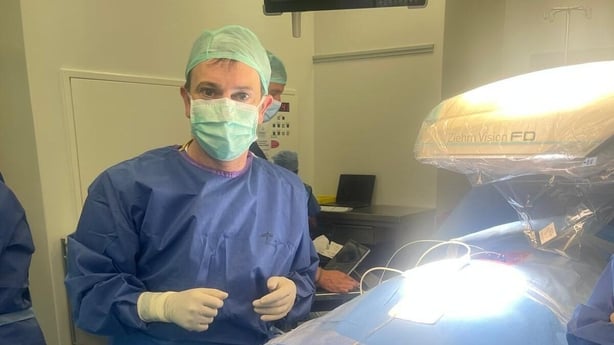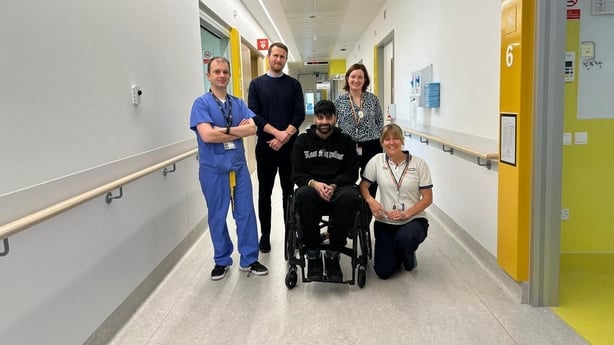A Mayo student who was paralysed in a road crash has been able to stand and walk after doctors implanted a spinal cord stimulator, which has restored movement and sensation in his legs.
Yousaf Ghaffar, 20, was told he would never walk again after he was paralysed from the waist down in the crash, which occurred near Letterkenny, Co Donegal, in 2022.
However, he is able to walk more than 400 steps at a time with an aid since having the operation last September, describing the procedure as giving him "a second chance" at living life again.
Doctors at St Vincent's University Hospital in Dublin, where Mr Ghaffar was operated on, believe the procedure is the first of its kind and could be a game-changer for patients with spinal injuries who were previously told they would never walk again.
The procedure was carried out by Consultant Pain Specialist Professor Kirk Levins in collaboration with the National Rehabilitation Hospital and researchers from the United States.
The technique, which has yet to be named, involved inserting rigid wire leads through an epidural needle to stimulate the spinal cord at a specific frequency and location.
"We implanted electrodes through a needle over strategic parts of the spinal cord and through these electrodes we supply energy through the spine and reactivate certain dormant circuits in the spine, allowing for voluntary movement," said Prof Levins.
The procedure took approximately three hours with Mr Ghaffar almost immediately showing movement in his legs which had not occurred in over two years.
Sensation returned weeks later and both doctor and patient say the results of the operation far exceeded their expectations.

"In the recovery room, as soon as we turned the device on and asked Yousef to move, he moved. It was a real 'wow moment'. We didn't expect to see such a result so early on and it was fantastic," explained Prof Levins.
"He cannot only move, he can feel. We never expected him to have a return of sensation, but he has. We can't explain it but it's there. It's groundbreaking. The hope is Yousef will walk independently and live an excellent life with full independence," he added.
Mr Ghaffar is now relearning how to walk. He is not yet walking independently but is making significant progress using an exoskeleton (a robotic suit and rehab tool). He recently walked 470 steps in an hour and is aiming to soon hit 1,000.
"After my accident, I asked the doctor 'Will I walk again?' He looked down with a disappointed look when you don't know what to say to the other person, and that's when I got my answer," the law student told RTÉ Radio One's Drivetime.
"My Mom came to me, and I said the doctors told me I won't walk again. But I said to her that 'watch, one day I will walk again,' and here I am, walking again.
"It's what any wheelchair user dreams of, is to be able to walk again. It felt weird at the start, but it's starting to feel natural again. The more I do it, the more the natural sense and natural rhythm is coming back."
The implant has also stopped Mr Ghafar from enduring painful spasms which at one stage rendered him unable to leave his house for four months. As a result, the Claremorris man says, "the life inside of me that was giving up, is now shining bright again".
"After Yousef had the implant put in, the spinal cord stimulator, the first thing we noticed was an improvement in his spasticity," said Dr Cara McDonagh, Consultant in Rehabilitation Medicine and Mr Ghafar's clinician at the National Rehabilitation Hospital.

"He had developed very extreme spasms which were painful and dangerous and could cause extreme injury and really that was the first thing that we noticed - the major improvement there.
"Then he started to get recovery in muscle activity and sensation and that's been growing since the surgery. We're hopeful to see further improvement, better muscle activity and more sensation which all goes towards his goal of walking independently."
Dr McDonagh believes Mr Ghafar could someday achieve his aim of walking unaided.
"We're monitoring, we're hopeful and we're certainly seeing encouraging signs. This is a new development, it's new to us. He's the first patient I've had that had a spinal cord stimulator inserted, so we just have to wait and see."
Doctors at St Vincent's Hospital are hopeful the complex and costly technique could be adopted for use in other patients but warn it will not be easy and could be many years from becoming more mainstream.
"This has the potential to transform the lives of other people with similar spinal injuries. With more research and collaboration, we will hopefully be able to roll this out to other patients not just here in Ireland, but globally," said Prof Levins.
We need your consent to load this rte-player contentWe use rte-player to manage extra content that can set cookies on your device and collect data about your activity. Please review their details and accept them to load the content.Manage Preferences
"However, it's a hugely costly treatment. So, we need further funding, and more people trained to implant the device," he added.
In the weeks after his surgery, Mr Ghafar resumed his studies at Atlantic Technological University Letterkenny for the first time since his accident and hopes to one day become a barrister.
"This procedure has truly given me a second chance. It has helped me live life again. It has helped me be happy again. The smile is back on my face. I don't have to worry about anything that I would have worried about previously without the implant.
"If you were to ask me, if I could go back and stop this accident, I wouldn't. I'd rather have this accident and live how I live now rather than how I did before. My understanding of life and how it can change within seconds, I know what that means now. I know how important life is.
"That's why you shouldn't take anything for granted and truly, I've been given a second chance."
Learn more about Yousaf Ghafar's story and his operation on RTÉ Radio One's Drivetime and Six One News this evening.







